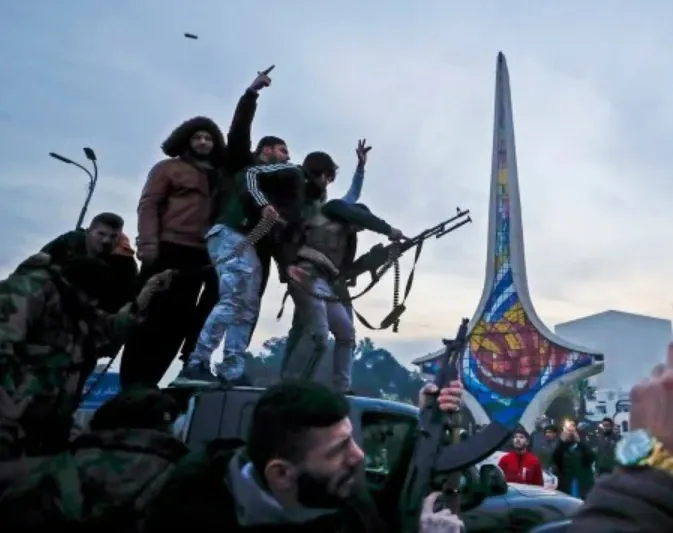What’s in today’s article?
- Why in News?
- Syrian Civil War: A Brief Overview
- Fall of Assad government in Syria
Why in News?
Syrian rebels toppled President Bashar al-Assad’s 24-year regime in a swift offensive, forcing the 59-year-old leader to flee to Moscow, where he was granted asylum.
The Islamist-led opposition declared the end of the 13-year civil war as Syrians celebrated by exploring and looting Assad’s presidential palaces, marking “the end of a dark era.”
Syrian Civil War: A Brief Overview
- Origin
- The Syrian Civil War began in March 2011 as part of the Arab Spring uprisings.
- Initially, peaceful protests demanding political reforms and greater freedoms erupted against President Bashar al-Assad’s authoritarian regime.
- The government’s violent crackdown on demonstrators escalated tensions, leading to armed conflict.
- Reasons
- Authoritarian Rule: Decades of oppressive governance under the Assad family created widespread resentment.
- Economic Hardship: High unemployment, corruption, and economic inequality fueled public dissatisfaction.
- Sectarian Divide: Syria’s Sunni majority resented the dominance of the Alawite minority, to which Assad belongs.
- Arab Spring Influence: Protests in neighboring countries inspired Syrians to demand change.
- Evolution into a Proxy War
- Internal Fragmentation: The conflict fragmented into multiple factions, including the Assad regime, opposition groups, Kurdish forces, and extremist organizations like ISIS.
- Regional Involvement:
- Iran and Hezbollah: Supported Assad to maintain influence in the region.
- Turkey: Backed rebel groups to counter Kurdish autonomy near its border.
- Global Power Rivalry:
- Russia: Intervened militarily to support Assad, securing its interests in the Middle East.
- USA: Supported Kurdish-led forces and moderate rebels to counter ISIS and Assad’s regime.
- Extremism: The rise of ISIS and other jihadist groups turned the war into a battleground against global terrorism.
- Timeline

Fall of Assad government in Syria
- About the news
- Assad, ruling the country since 2000, having inherited the legacy from his father Hafez al-Assad since 1971, was forced to flee the country on December 8.
- This was after Islamist rebels led by Hayat Tahrir al-Sham (HTS) marched into the Syrian capital.
- Bashar al-Assad’s Rise and Rule
- Assad assumed power in 2000 at the age of 35, transitioning from a reluctant leader to a popular figure by 2009, with 68% of Arabs supporting him.
- Initially informal and modern in style, he was trained as an ophthalmologist and actively engaged with the public.
- A strong personality cult developed around Assad, evident in hoardings, pictures, and posters throughout Syria.
- His economic liberalization policies favored modernization but neglected social justice, causing hardships for lower social strata.
- The Prelude to Civil War
- Public grievances included economic struggles, democratic demands, and fears of growing religious extremism.
- Inspired by the 2011 Arab Spring in Tunisia, Egypt, and Libya, protests emerged in Syria but were harshly suppressed by Assad.
- The crackdown escalated into a civil war, with the US backing rebels and Russia, Iran, and Hezbollah supporting Assad.
- Accusations of chemical weapon usage further tarnished Assad’s regime.
- The Role of HTS and Rebel Movements
- Evolution of HTS
- Formed in 2012 as Jabhat al-Nusra, initially affiliated with the Islamic State of Iraq.
- Disavowed ISIS in 2013 and pledged allegiance to Al-Qaeda, only to sever ties with Al-Qaeda in 2016, transitioning into Hayat Tahrir al-Sham (HTS).
- HTS shifted focus to local governance and pragmatism, earning the label of “political jihadists” over “Salafi jihadists.”
- Shifting Dynamics in 2023-24
- Assad’s allies—Russia, Iran, and Hezbollah—were weakened due to external conflicts like the Ukraine war and clashes with Israel.
- Turkey provided support to rebel factions, including HTS, capitalizing on the vulnerability of Assad’s regime.
- By April 2024, HTS leader Abu Muhammad al-Jawlani expressed renewed ambition, predicting rebel control over key cities such as Aleppo and Damascus.
- New Delhi’s Cautious Stance
- Experts in New Delhi recall how the Arab Spring experiment in Libya, after the fall of Gaddafi, quickly unravelled into chaos. And how in Egypt, the Muslim Brotherhood took control.
- So, there is caution in the Indian establishment on how it will play out in Syria post-Assad.
- Evolution of HTS
- Analysis
- Daunting Challenges Ahead
- The rebel coalition announced plans for a transitional government and free elections.
- However, stabilizing Syria remains a monumental task, requiring reconciliation among factions and substantial aid for reconstruction after years of devastation.
- Strategic Losses for Russia and Iran
- Russia and Iran, Assad’s main allies, suffered significant setbacks.
- Russia’s focus on Ukraine and the weakening of Hezbollah due to Israel’s recent strikes diminished their influence.
- Humanitarian Implications
- The fall offers hope for millions of refugees in neighboring countries to return home.
- However, rebuilding the war-torn nation will demand coordinated international efforts and substantial investments to restore infrastructure and stability.
- Daunting Challenges Ahead
Q.1. Who led the rebel offensive that toppled Assad’s regime?
The Islamist-led group Hayat Tahrir al-Sham (HTS) spearheaded the offensive, capturing key areas in Damascus and forcing President Bashar al-Assad to flee to Moscow.
Q.2. What challenges does Syria face after Assad’s fall?
Syria faces challenges in rebuilding, reconciling rival factions, and securing international aid to restore stability after years of conflict and devastation.
News: Why New Delhi is cautious about events in Syria: history of rebels, to their geography | India Today | NY Times
Last updated on June, 2025
→ UPSC Notification 2025 was released on 22nd January 2025.
→ UPSC Prelims Result 2025 is out now for the CSE held on 25 May 2025.
→ UPSC Prelims Question Paper 2025 and Unofficial Prelims Answer Key 2025 are available now.
→ UPSC Calendar 2026 is released on 15th May, 2025.
→ The UPSC Vacancy 2025 were released 1129, out of which 979 were for UPSC CSE and remaining 150 are for UPSC IFoS.
→ UPSC Mains 2025 will be conducted on 22nd August 2025.
→ UPSC Prelims 2026 will be conducted on 24th May, 2026 & UPSC Mains 2026 will be conducted on 21st August 2026.
→ The UPSC Selection Process is of 3 stages-Prelims, Mains and Interview.
→ UPSC Result 2024 is released with latest UPSC Marksheet 2024. Check Now!
→ UPSC Toppers List 2024 is released now. Shakti Dubey is UPSC AIR 1 2024 Topper.
→ Also check Best IAS Coaching in Delhi





















